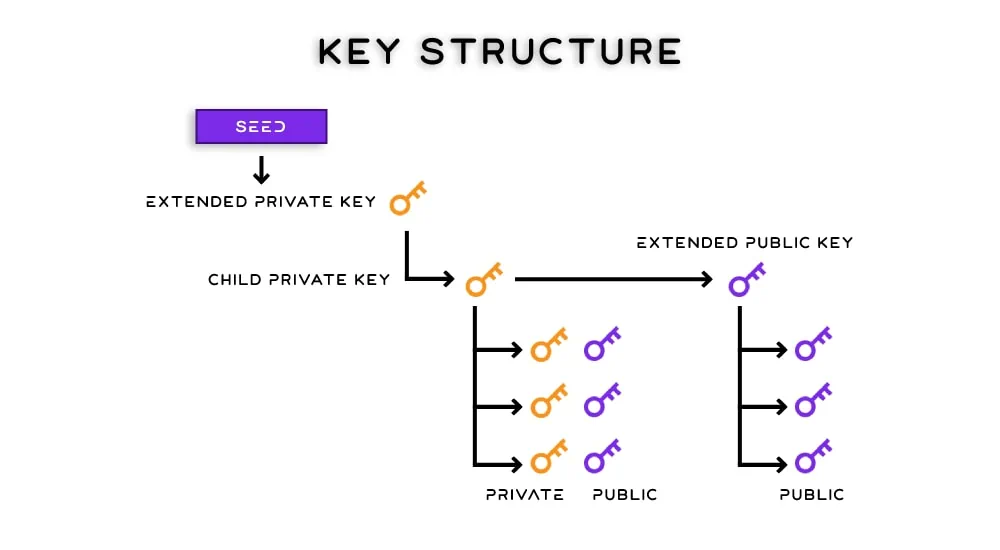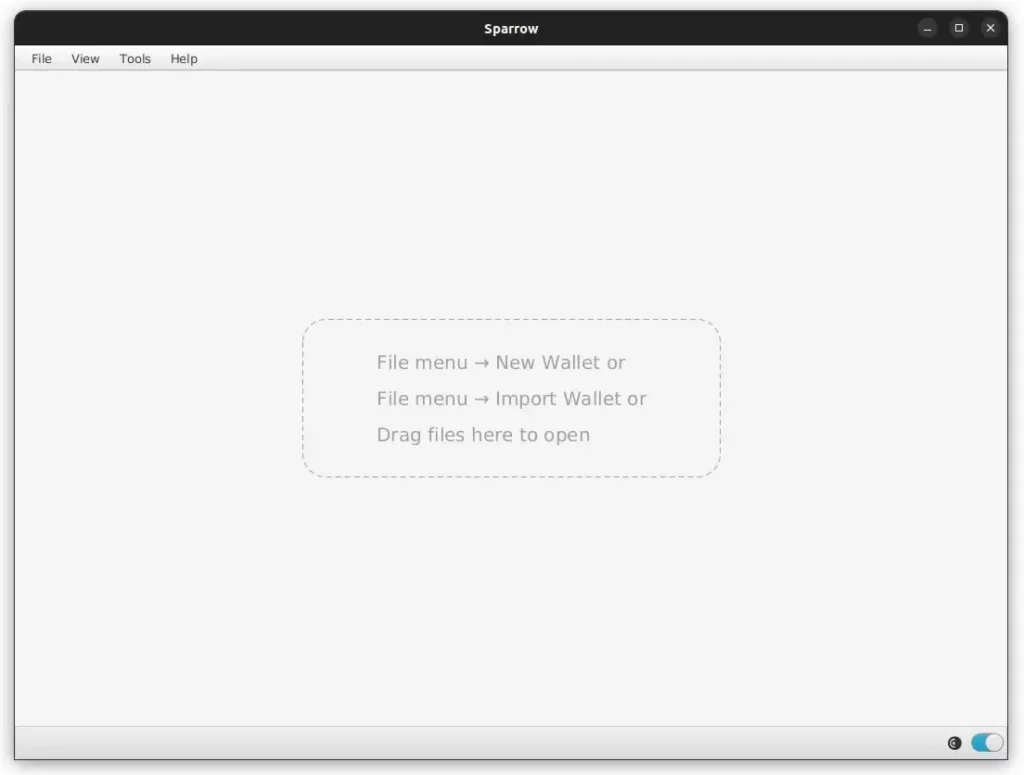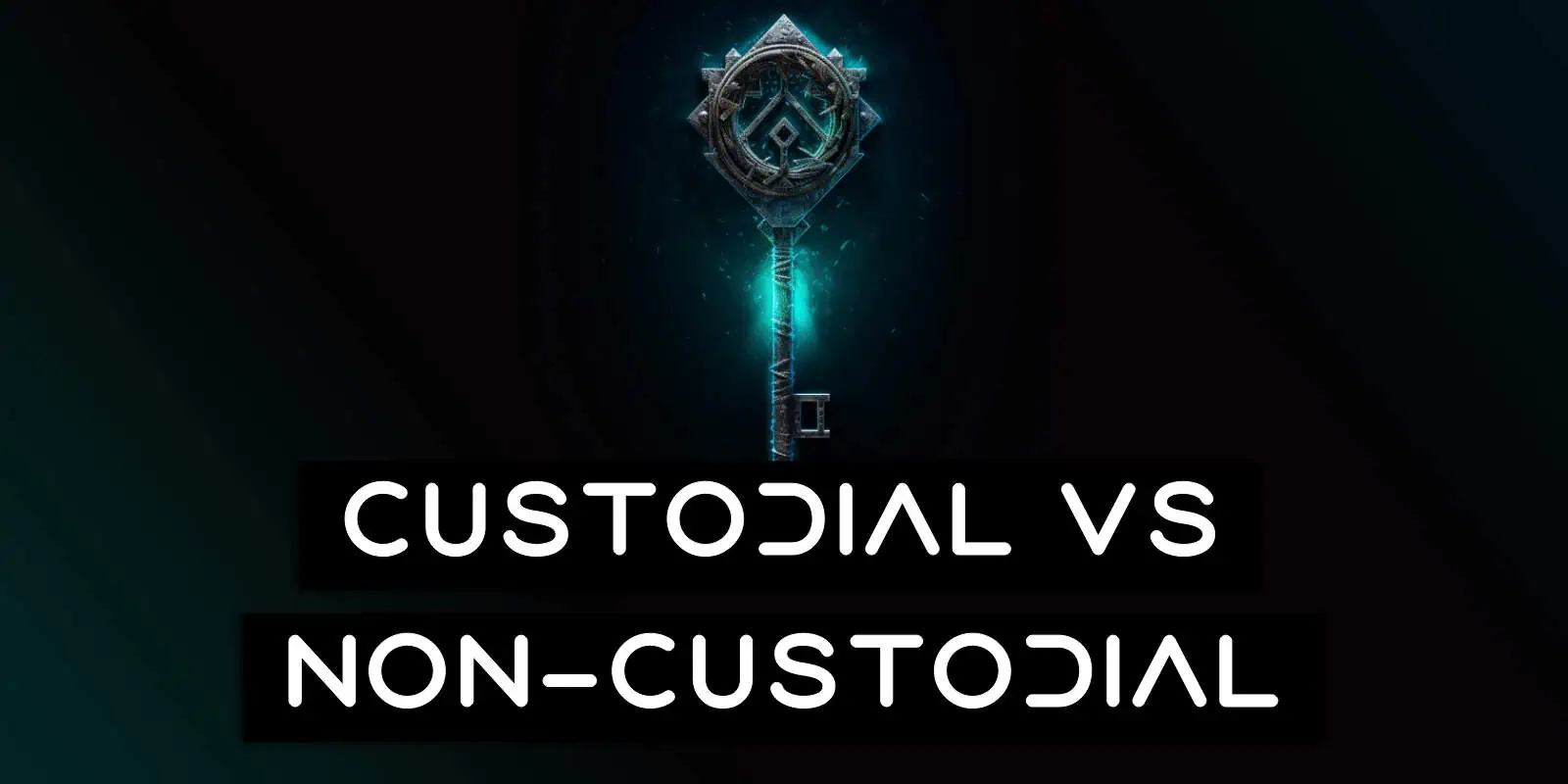Bitcoin wallets are very different to the traditional leather wallet you might carry in your pocket and not just because we’re talking about digital assets. They’re different even compared to traditional digital wallets like what you might use with PayPal or your online bank account number. One of the key differences is what makes it a custodial vs non custodial wallet.
Contents
What Is A Private Key
Before we explain the difference between custodial and non custodial crypto wallets, it’s best to first understand what private keys are. A private key is a cryptographic key that gives you access to your bitcoins on the Bitcoin network and looks something like this:
185082410266061011419354707831708373725981652362318265124838197206310542791322
This huge random looking number is obviously impossible for normal people to remember so modern wallets instead use this to generate your Mnemonic Sentence. This is either the 12 or 24 words that most wallets show you and ask you to store in a safe place. The Mnemonic Sentence is most commonly referred to as a Seed Phrase, but it also goes by the names Mnemonic Words, Seed Recovery Phrase or Backup Seed Phrase.

>> Deeper Dive: What Public And Private Keys Are
While most people wrongly believe that their bitcoin wallet “stores their bitcoin” this isn’t true. Bitcoin Wallets do not store any bitcoins! The name “wallet” is used because the creators are trying to make it easily relatable to everyday NPC’s, but in actual fact Bitcoin Wallet software isn’t like a normal “wallet” that might store physical cash or coins.
Instead, Bitcoin Wallets only ever store your private keys which is what gives you access to your bitcoins. Every bitcoin is and always has been located on the Bitcoin network. In summary:
- Bitcoin Wallet: Stores your private keys
- Bitcoin Network: Stores your bitcoins
This might seem like a simple distinction, but it’s a critical one that is very important to understand and embed right from the start as otherwise it leads to lots of confusion. Now that you understand what private keys are and what wallets really store, we can address the original question!
What Is A Custodial Wallet?
A custodial wallet is one where a third party (or custodian) holds the private keys to your bitcoin on your behalf, giving them full control over your funds.
Most custodial wallets are accessed through a web browser just like you might login to your bank or email account. The most common types are ones that are built into Crypto Exchanges so that the user can buy and sell their bitcoin directly from the wallet provider.
This, along with the ability to have the custodial reset your password if you ever lock yourself out do make for some handy benefits to custodial wallets. However there’s significant downsides too.
As the custodian holds your private keys, they can block you from accessing your funds or from transferring them to other wallets just like a bank. They also almost always require you to submit to KYC or AML (Anti Money Laundering) identify verification which then forever ties any bitcoin you buy to your real world identity.
Obviously both of these are the norm for the traditional financial world, but it’s not something that is required when dealing with bitcoin.
What Is A Non Custodial Wallet?
A non custodial wallet (also called a self custody wallet) is one where you hold the private keys to your bitcoin and have full control over them.
Some examples include Sparrow Wallet, Nunchuk, Bluewallet and even Bitcoin Core. While non custodial crypto wallets can come in all shapes and sizes and are even offered by some crypto exchanges like the Coinbase Wallet, they all have the common trait that you and only you hold the private keys to it.
This means that you can take those private keys and send your funds to whomever you want at any time you want from anywhere you want and without anyone else being able to stop you. There are also no KYC or AML tests to pass, meaning it takes literally seconds to download and use. In contrast many custodial wallets can take days to “approve” your account.
As there’s no KYC process, it also means you can transact much more privately. The wallet you download and install has no idea who you are and so cannot link your real world identity to any transactions you make with it.
You can also easily and quickly create 1, 10 or even 1,000 new wallets if you want, all for free and in minutes. Non custodial wallets also allow for more advanced security features such as Multisig or other special transaction types that usually aren’t available to custodial wallets.
New to Athena Alpha? Start today!
Custodial Vs Non Custodial
While not specifically stated in the Bitcoin Whitepaper, the general ethos of Bitcoin is that you should always hold your own private keys by using a non custodial crypto wallet. You should be the only one that holds the private keys as otherwise you have to place your trust in other third parties.
While some people choose to willingly give their private keys to other businesses – typically centralized exchanges – it’s not recommended, especially for medium to large amounts. When a wallet is “custodial” it means you only have access to your bitcoins if that third party allows you to.
>> Learn More: How To Send Bitcoin
If they think you have done something wrong, don’t like where you want to send your bitcoins, think you have violated their T&Cs, are forced by a government or simply just go bankrupt or get hacked you will lose access to your funds.
Virtually all of these third parties now also force you to prove your identity with highly invasive privacy checks as noted earlier. Furthermore, it can mean it takes much longer to send your bitcoins if you have to wait for their approval. Many have had to wait months with no other option simply because someone else tried to hack their account.
This isn’t just theoretical either, people have repeatedly Lost Bitcoin that were stored with these third party companies through hacks, employees disappearing with customer funds (fraud), CEO’s dying and losing the access to the funds and lately, degenerate and greedy gambling of customer funds.
While there are a few legitimate use cases for using custodial wallets, there are many, many excellent non custodial wallets available across all platforms that are just arguably better in most metrics. Don’t let anyone fool you into giving up your private keys. As the famous saying goes…
Not your keys, not your coins!
Key Features To Look For In A Non-Custodial Wallet

When choosing a wallet to store your digital assets, try to make sure it’s:
- Non-Custodian: Make sure you always have full control of your private keys
- Reputable: Make sure you fully research and vet the wallets reputation and history. There have been many cases of malware disguised as wallets that steal your bitcoins, so do your research carefully before deciding which one to use and trust. This also goes for any hardware wallet devices you use
- Standardized: Make sure it supports the BIP39 standard and is generally not proprietary. Ideally you want it to be open source software that has been vetted by trusted security audits and the bitcoin community over many years
- Verifiable: Make sure it allows you to verify the signature of the manifest files with PGP keys as well as a shasum to confirm the authenticity of the binaries. This ensures that the software files you’re downloading are actually from the developers and haven’t been secretly replaced by hackers. An example of this info can be seen here and we go through the full process in our install guides above
- Backup: Make sure it has robust backup and restore capabilities built into it
There are many more features that wallets have such as fee control, Coin Control, password protection, Tor, Full Node connectivity and more.
How Do I Create A Non-Custodial Wallet?
Creating non custodial crypto wallets is super easy and can be done in seconds from any computer or mobile device. In essence you just download an app, install it and generate your new personal wallet. You don’t even need to sign up to anything or create an account for most of them.
There are dozens of different Bitcoin Wallets out there, but only some are non-custodial. If you’d like to setup your wallet on your phone, we recommend wallets such as Nunchuk, Bluewallet or Bitcoin Keeper.
For desktop computers wallets, we recommend Sparrow Wallet and cover how to create one in our other article Sparrow Wallet: Ultimate Quick Start Guide For Beginners. This piece outlines all the key steps you’ll need to do to create your own non custodial wallet such as:
- Installing and setting up Sparrow (both Windows & Ubuntu)
- Creating a new wallet in Sparrow
- Sending and receiving bitcoins in Sparrow
- Backing up your new wallet
Even if you’re wanting to setup your wallet on your phone, it has heaps of great info that’s easily applied to most mobile wallets out there too.
Are Non-Custodial Crypto Wallets Safe?
Yes. One of the biggest sticking points for people when they consider using a non custodial crypto wallet is the private key management. Many users, especially new ones, get worried that they’ll lose access to their funds by forgetting or loosing their private key.
In a non custodial crypto wallet, if you loose the private key there is no way to recover the funds. There’s no one else to call to reset your account. It’s just you taking sole responsibility for your funds, so it’s important you have strong security measures that protect the private key at all times.
Many think this is hugely complicated and so default to using a custodial wallet service provider, but at the end of the day you just need to safe guard 12 or 24 words. We recommend all users buy and use a Hardware Wallet to generate and store their private key and at minimum keep a backup recovery seed phrase card off-site somewhere safe.
We have plenty of in depth articles on how to do this, but for most it just means buying a Hardware Wallet and safely storing a piece of laminated paper (or metal seed phrase plate) off site, which we don’t believe is too complicated.
- A Beginners Guide To Bitcoin Security
- How To Protect Your Bitcoin Private Key
- How To Protect Your Crypto
Once a user’s funds are holding substantial amounts, then things can get a bit more complicated with multi signature authentication or other setups. But for 99% of people a single hardware wallet and off site backup is more than enough and much safer than trusting a custodial wallet provider that could go bankrupt or stop you from having complete control over how you want to spend your funds.
What Risks Are There With Non-Custodial Wallets?
While the main risk with non custodial crypto wallets is loosing or forgetting your private keys, there are other minor risks such as accidentally downloading a malicious wallet app that steals all your funds.
This is obviously a real and serious threat, but we should also point out it’s also applicable to custodial wallets too, as you could accidentally use an online wallet provider that’s malicious or that later on becomes malicious due to hacks by outside or internal people.
Another risk with non custodial wallets is that someone might break into your house and steal your private keys somehow. This is another reason why we heavily recommend that if you do decide to purchase crypto that you secure it with a non custodial hardware wallet. They help to securely store your digital assets with a PIN so you don’t lose all your funds if someone steals it.
Good hardware crypto wallets are protected by PINs and have secure elements that protect the private keys offline with things like AES hardware encryption. Hardware wallets are also commonly referred to as cold wallets as they separate your funds into “cold storage” from the “hot” computer which is connected to the Internet and thus, more susceptible to hacking.
What’s The Best Non Custodial Wallet?
Your non custodial crypto wallet should be made up of two parts:
- Software Wallet: This is the software program on your computer or phone
- Hardware Wallet: This is the physical device that stores your private key
Software Wallets
We don’t recommend people setup the wallet that holds the majority of their funds on their phone as they’re easily lost or stolen. This causes more headaches as you then have to worry about migrating to a new wallet anytime you lose or damage it.
For wallets that are used day to day and hold smaller amounts, like a traditional wallet would, we recommend wallets such as Nunchuk, Bluewallet or Bitcoin Keeper.
For desktop computers wallets, we recommend Sparrow Wallet.
Hardware Wallet
We have an extensive list of Hardware Wallets that we’ve fully tested, rated and reviewed, but some of the highest rating, best non custodial wallets can be seen below.
FAQ
What’s The Difference Between A Custodial And A Non-Custodial Wallet?
A custodial wallet is one where a third party will hold and manage your private key for you. They are in full control of your funds and can stop you from spending them or worse, lose them. A non custodial wallet is one where you personally hold the private key. This gives you immediate and full control over your funds at all times.
What Is The Most Popular Non-Custodial Wallet?
As most non custodial wallets are extremely privacy focused, it’s often impossible to know how many users or downloads each of the various wallets have. There’s also different types such as hardware wallets or software wallets. Some popular ones we recommend include Sparrow Wallet or the COLDCARD Mk4.
Is Coinbase A Custodial Or Non-Custodial Wallet?
The main product offering for Coinbase is a custodial wallet where they hold and control your private key. They do however also offer a stand alone non-custodial wallet called Coinbase Wallet.
Is Kraken A Custodial Or Non-Custodial Wallet?
Kraken is a custodial wallet as they hold and control your private key. This allows them to monitor all your transactions and balance amounts. It also means that if they go bankrupt you will lose all your funds. They can also prevent you from spending your funds if they want.
Is Ledger A Custodial Or Non-Custodial Wallet?
Ledger is a company that makes Hardware Wallets. They are non custodial wallets that can store digital assets, but are not recommended due to the numerous safety and privacy issues they’ve had over the years including having all their customers private data stolen via hacking.
Is BitPay A Custodial Or Non-Custodial Wallet?
BitPay is a custodial wallet as they hold and control your private key. This allows them to monitor all your transactions and balance amounts. It also means that if they go bankrupt you will lose all your funds. They can also prevent you from spending your funds if they want.
Is Crypto.com A Custodial Or Non-Custodial Wallet?
Crypto.com is a custodial wallet as they hold and control your private key. This allows them to monitor all your transactions and balance amounts. It also means that if they go bankrupt you will lose all your funds. They can also prevent you from spending your funds if they want.



